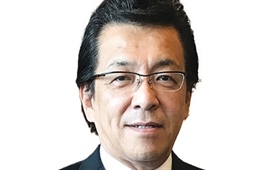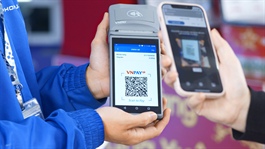Consumer finance groups tap new funds
Consumer finance groups tap new funds
International expertise and solid financial support are vaulting some consumer finance companies in Vietnam ahead of their peers, and also presenting opportunities for both sides to deploy excess capital and diversify their business.

Lenders are more likely to try and capitalise on overseas experience. Photo: Le Toan
|
In April, Japanese financial institution Sumitomo Mitsui Financial Group – which is the parent of Sumitomo Mitsui Banking Corporation (SMBC) – successfully acquired 49 per cent in Vietnam’s largest consumer finance company FE Credit in a $1.4 billion deal – the largest financial merger and acquisition (M&A) deal in Vietnam.
Accordingly, FE Credit’s valuation is estimated to be around $2.8 billion, which is higher than mid-sized banks in Vietnam such as VIB, HDBank, SHB, and OCB.
According to an integrated service provider of financial data FiinGroup, FE Credit has a price-to-earnings (P/E) ratio of nearly 22 with a price-to-book (P/B) ratio at 3.4, which is nearly 40 per cent higher than the average transactions involving consumer finance companies in the past few years. The price is higher than the valuation of other bank stocks which have average P/E and P/B ratios of 16 and 1.79 respectively.
FE Credit is currently the market leader in Vietnam’s consumer finance industry and currently accounts for half of the market share, far surpassing the other 15 competitors.
Due to the pandemic, companies are recording lower earnings and higher bad debt. However, FE Credit still posted good financial results higher than the market average during the crisis. Its operating income reached VND18.23 trillion ($789 million) in 2020, down more than 3 per cent. Meanwhile, its after-tax profits stood at VND2.97 trillion ($129 million), a 17 per cent decrease.
VPBank’s chairman Ngo Chi Dung said that there were two plans for share sales including an initial public offering (IPO) or selling to strategic partners. In case of an IPO, FE Credit could be valued up to $4 billion.
FiinGroup believed in the short term, the cash will flow into the financial company at $154 million as VPBank has increased charter capital for FE to VND10.9 trillion ($470 million) before the transaction was announced. More than money, the billion-dollar deal will add more synergies into the firm’s future potential.
“With cheap capital from Japanese banks, FE Credit can mobilise new capital or restructure mobilised capital to improve cost, net interest margin, and profit. Indeed, financial companies with investment from Japanese partners such as HD Saison, Mcredit, or JACCS have adopted the strategy,” FiinGroup said.
SMBC’s big bet on FE Credit is part of the group’s medium-term strategy in expanding its franchise in Asia. SMBC expected the investment will generate synergies in two ways: sharing its business know-how with and absorbing business know-how from its partners.
SMBC is one of the three largest megabanks in Japan – together with Mizuho and Mitsubishi UFJ Trust and Banking Corporation – with total assets of over $2.1 trillion as of last year. SMBC has compelled its retail banking, corporate banking, and investment banking businesses across over 40 countries.
FE Credit recorded an impressive profitability, even when the pandemic has taken a serious toll in the global economy, with its return on equity of over 20 per cent, compared to nearly 30 per cent of previous years. SMBC also highly appreciated FE Credit’s efficient system and wide network, with a capital expenditure ratio of approximately 30 per cent. The consumer finance firm boasts 20,000 business points and branches, as well as 13,000 staff.
Other consumer finance companies are also eager to tap into foreign funds. SHB Finance of commercial bank SHB, for example, said it would need an additional $25-30 million in capital to diversify business channels as well as ensure sound financial sources with an affordable cost.
Dinh Trong Thinh, senior lecturer at the Academy of Finance, cautioned that it is getting intrinsically difficult to obtain a license for consumer finance company establishment. Therefore, savvy foreign investors might see mergers and acquisitions as the most cost-effective and quickest approach.
“Foreign acquirers often look for smoothly-run consumer finance companies to pour cash in. Due to the large existing customer base and vast experience of local companies, they would easily penetrate into the local market, instead of starting from scratch with a brand new entity that is both time-consuming and difficult to gain customers’ trust,” explained Thinh at a VIR-led consumer finance seminar.


























